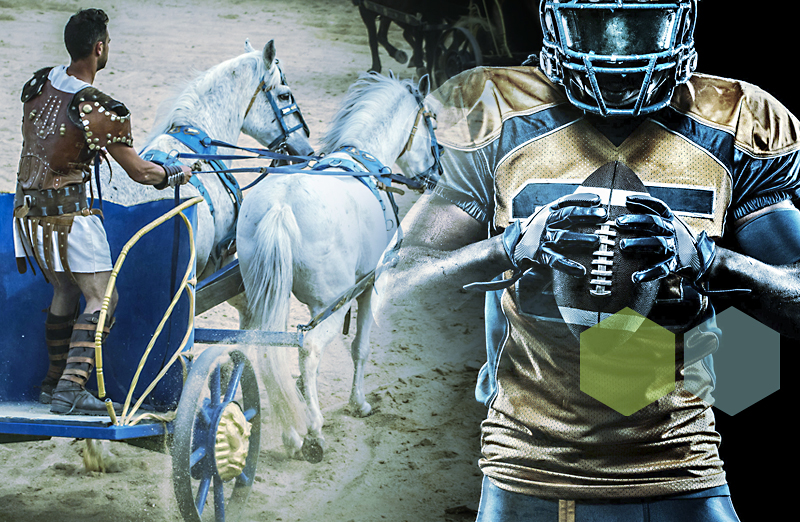From Ancient Chariot Races to Super Bowl Betting Bonanzas
Picture the scene: You’re in ancient Rome. Twelve charioteers strive not to crash or “shipwreck” while completing seven bone-jarring laps at 30 plus miles an hour. More than 200,000 of your closest friends are screaming for their elite drivers to nose across the finish line in a huge oval stadium called the Circus Maximus.
Now, fast-forward the scene in your mind. See packed masses of 65,000-plus fans, many shirtless and belly-painted, streaming in to Raymond James Stadium in Tampa, Florida (No COVID-19 in our imagination). They seesaw from agony to ecstasy as incredibly talented, highly chiseled muscle men block, tackle and bulldoze through to their respective end zones.
What do these two scenarios have in common besides numerous spectators, intense competition and gut-wrenching drama for its devotees?
Gambling. Whether the currency was denarius or the conduit DraftKings, the money dropped at these events rivals a Congressional Cares Act package on steroids. As the single most popular sports betting event, Super Bowl 2021 is expected to generate $270 million in legal wagering—peanuts compared to an estimated $6.8 BILLION in “non-legal” bets.
Two ancient observers wrote that young men at chariot races engaged in “shouting, audacious betting…” and that they were “blind with passion and agitated about their bets.”
Today’s gamblers are no less enthusiastic and their options for abuse have expanded:
- It’s fast and easy to place a bet in Ohio, even though our Legislature has not yet legalized sports betting.
- Online betting also is discreet. Spouses and loved ones may not know how much, or how often, their gambler lays it on the line.
- As was evident during some of the professional tennis scandals a few years ago, you can lose money a whole variety of ways beyond whether your team won or lost within a particular point spread. You can bet on minute-by-minute actions, such as whether a team will achieve a first down or if the defense can intercept a certain pass.
- We’ve cultivated a culture where gambling isn’t just acceptable, it’s expected and celebrated. A Governor wagers homegrown foods and products against a Governor from rival college football states. (Team Up North ring a bell?) Point spreads and pay-offs are featured on pre-game shows as commentators offer their picks. “Everybody’s doing it” – in extremis.
All of this can amount to harmless fun and shared entertainment. Until it doesn’t. People addicted to gambling find Super Bowl Sunday as tough to navigate as people with substance abuse who are invited to Friday Happy Hours. It’s like dieting on Thanksgiving and budgeting on Christmas, only worse. People with gambling addiction don’t just enjoy taking risks, their brain function and chemistry compel them to do so. It’s a disorder, not a desire. And, like a person using heroin can’t see a needle without thinking of using it, a problem gambler never heard of a bet they didn’t think they could win.
The consequences of untreated gambling addiction are enormous. One early observer wrote that those putting money on the outcome of chariot races “won or lost estates.” Today’s pathological gamblers stand to lose their savings, retirement, home and, eventually, their job, friends, family and maybe even their life. Suicide rates among those with gambling disorders are higher than any other group of people with addiction.
So, this Super Bowl Sunday, be thoughtful. Remember that not everyone can just “lose a little” and laugh. Past history may not be the best future for people that you love.
